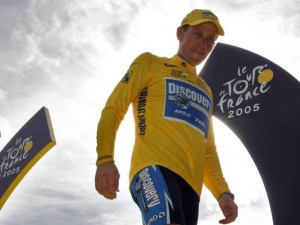A few months ago I wrote a post called “Lance Armstrong Was Robbed,” in which I opined that he didn’t deserve to be stripped of his seven Tour de France titles. I’m back to tell you I was wrong.
Like most Americans, I’m a sucker for stories about people who overcome serious adversity to achieve great things. Those stories have given me the extra push I needed over the years to bring my own demons to heel. That Armstrong won seven titles didn’t matter to me as much as the fact that he did it after beating testicular cancer. I also argued that the use of performance-enhancing drugs was beside the point; that without the raw talent and drive, all the drugs on Earth wouldn’t have pushed him to seven victories. Rightly or wrongly, I still believe that.
But I’ve had a change of heart about him being robbed after reading about his interview with Oprah Winfrey, in which he admitted to the doping. In fact, he reportedly told her that he started using performance-enhancing drugs to gain an edge in cycling in the mid-1990s — before he was diagnosed with cancer. USA Today reveals that Armstrong engaged in a cover-up that involved “attacking anyone who implicated him.”
According to the article, Armstrong’s admission that he started doping in the mid-1990s is consistent with the evidence revealed in October by the US Anti-Doping Agency.
Nobody likes to be wrong. But admitting you were wrong is better than attacking those who question you, especially when it becomes painfully clear to everyone that you’re covering something up.
I’d rather be a rational human being who can have a change of heart in the face of facts than a stubborn person whose pride won’t allow him to see the truth.


A lot of Armstrong’s defenders feel similarly. I too was surprised at learning when the doping actually started. I wonder if he’s now trying to float a trail balloon that everyone in cycling dopes and therefore his wins were still true wins against like competitors.
Anne, that is a good point I had not thought of. Bill: my hats off to you, man! It takes a big person to admit when he’s wrong and may have made a mistake!
In your former article, where you defended the now disgraced cyclist, you wrote that “People say steroids gave him an unfair advantage. I say the damage his body suffered from cancer put him at a huge disadvantage going in. The doping controversy is bullshit.” If you were consistent with your former reasoning, you should write the same even after Lance Armstrong confessed using doping. Of course, we know this is nonsense: it is clear that doping gives an unfair advantage.
But what is more digusting than just cheating, in my opinion, is the relentless actions of Armstrong in destroying the lives of people reporting his cheating: David Walsh, Pierre Ballester, Emma O’Reilly, and probably many others, have suffered not only from defamation lawsuits, but also from the bullying tactics Armstrong constantly used against them. At least, if you cheat, you should keep a low profile about it. But Armstrong actions against those people show he is a monster.
The problem is that many people wanted a legend, build one around his return from cancer, and unfairly dismissed the reports from many whistleblowers. Of course, Armstrong is certainly not the only one to blame (UCI directors are very much responsible too.)
Eric, I very much agree. I was the copyeditor for Tyler Hamilton and Daniel Coyle’s The Secret Race, which came out last fall. (Actually one of the copyeditors — they were adding material as I worked on it, and I was too busy to do the second pass.) I don’t follow cycling. When I started, I knew who Armstrong was and that’s about it. So I fact-checked the names of people and places and in the process learned a lot about Hamilton, Armstrong, pro cycling, doping — and hero worship. So many cycling fans just did not want to hear anything negative about Armstrong. They vilified Hamilton instead, and everyone else who dared suggest that Armstrong was lying, even as the evidence piled up and up and up.
I think this story goes way beyond cycling or sports. It’s the story of a sick, sick system and how it pulls people in and changes them. Tyler Hamilton is a modern-day Faust: If the only way to realize your life’s dream is to deal with the devil, do you do it? And if you do, what happens next? So many people seem so sure that in Hamilton’s position they would have walked away from the dream. Some of them would have, I’m sure, but most of them? I doubt it. If they looked honestly at the compromises they’re making in their own lives, they’d know better.
I heartily recommend Secret Race btw. It’s a riveting story, and one that demands considerable courage of its readers.